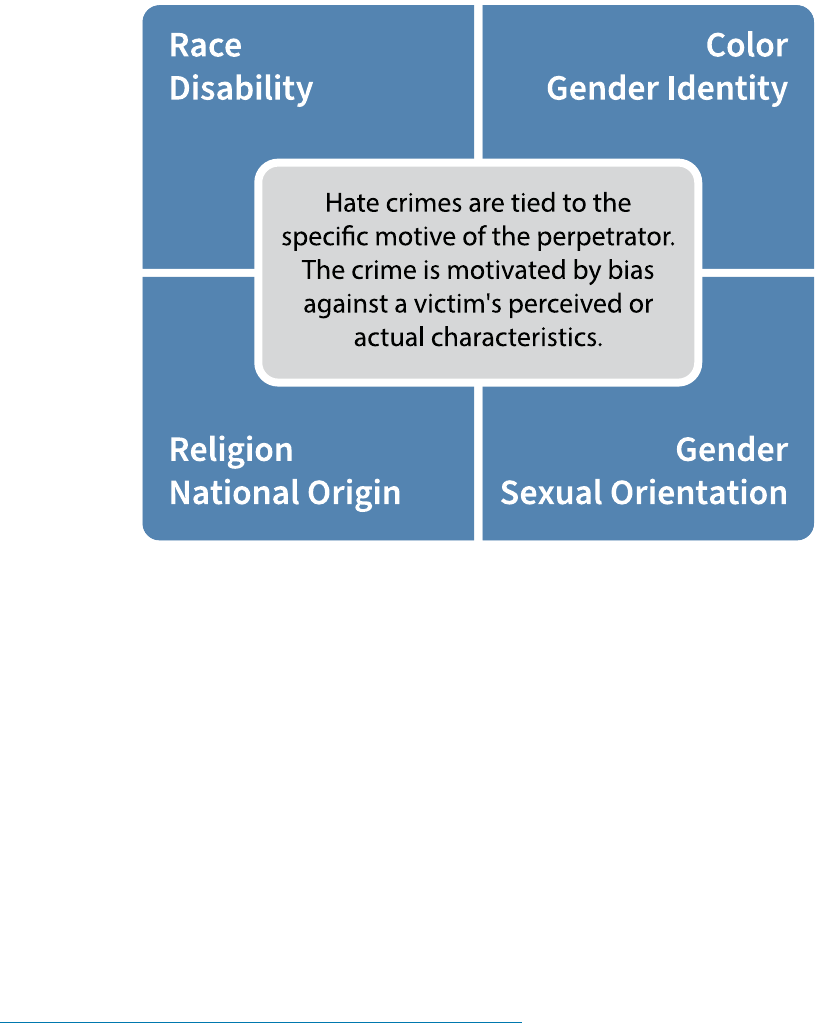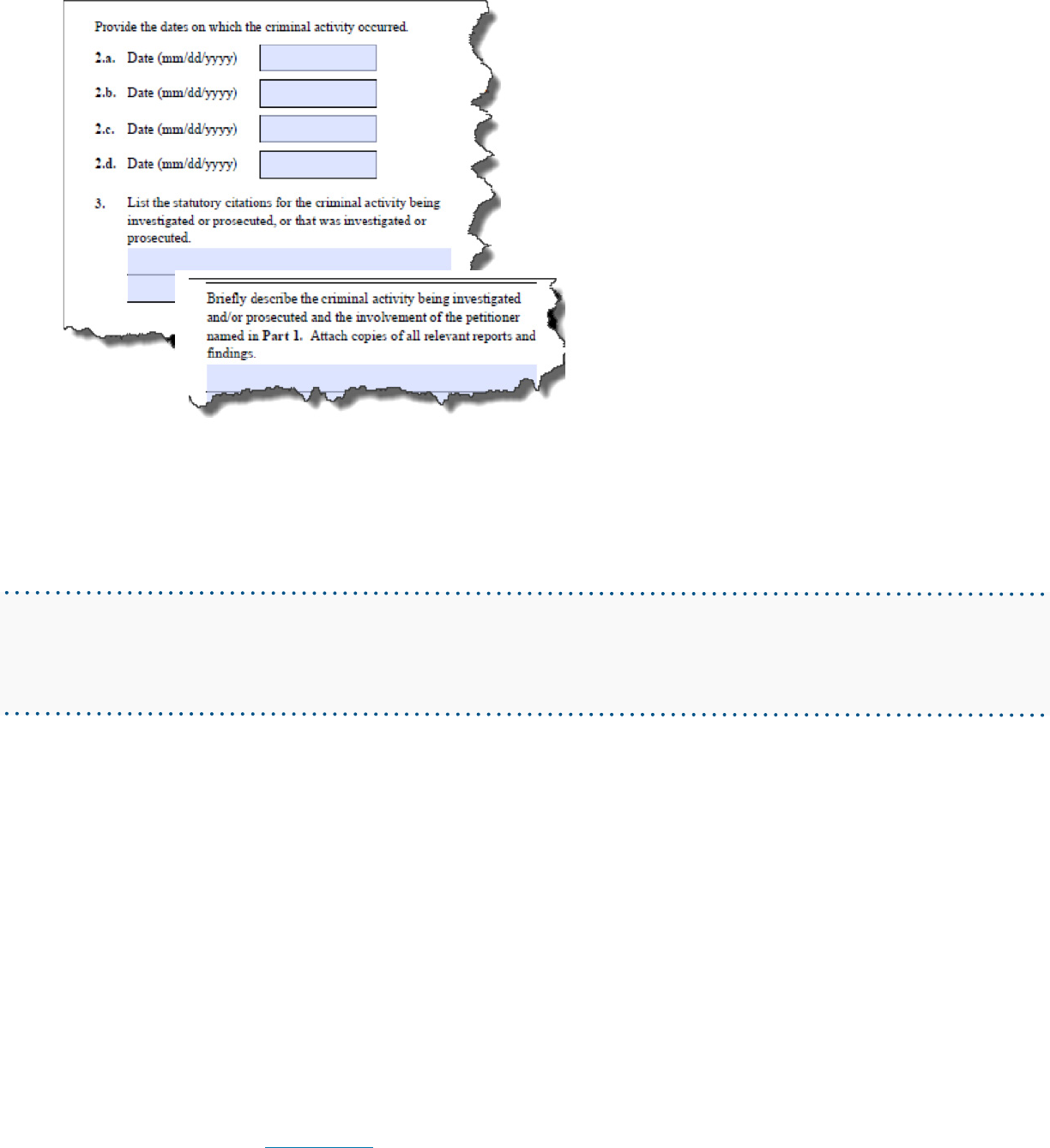
U VISA
LAW ENFORCEMENT
RESOURCE GUIDE
For Federal, State, Local, Tribal and Territorial
Law Enforcement, Prosecutors, Judges and
other Government Agencies

U Visa Law Enforcement Resource Guide
|
ii
PROMOTING A VICTIM-CENTERED APPROACH
DHS strives to use a trauma-informed, victim-centered approach to combat serious crime.
This approach includes practices to minimize victimization and additional trauma, and equally values:
The identification and stabilization of victims, including providing immigration relief, and
The detection, investigation, and prosecution of perpetrators of serious crimes.
Noncitizens who have been victimized oen:
Distrust law enforcement, and fear arrest and deportation;
Fear for themselves and family members;
Worry about immediate needs (food, shelter, family);
Have medical needs, including psychological support;
Are confused about the U visa process; and
May face language and cultural barriers.
When encountering a noncitizen victim, it is critical to develop rapport and establish trust by:
Connecting the victim to a victim assistance specialist who can connect the victim to support
services;
Explaining your role, answering their questions , and addressing their fears and urgent needs;
Being sensitive to cultural differences and language barriers and using a competent interpreter
when needed;
Conducting interviews in a neutral location, only after the victim’s urgent needs have been
met; and
Being patient and giving the victim time to stabilize.
For more information and strategies for implementing a victim-centered approach, go to:
https://www.dhs.gov/blue-campaign/victim-centered-approach.

U Visa Law Enforcement Resource Guide
|
iii
QUICK REFERENCE GUIDE FOR CERTIFYING AGENCIES
Why is the U Visa Important?
Strengthens law enforcement’s
ability to detect, investigate, and
prosecute crimes
Offers protections to noncitizen
victims of qualifying crimes in
keeping with U.S. humanitarian
interests
What does a U visa provide?
Lawful status for up to 4 years
Employment authorization
(Work permit)
May provide lawful status to
qualifying family members
What are the requirements for a U visa?
» The petitioner:
Was a victim of a qualifying criminal activity, that occurred in the U.S. or violated
U.S. law;
Has specific, credible, and reliable information about the qualifying crime;
Was, is being, or is likely to be helpful to the certifying agency in the detection,
investigation, prosecution, conviction, or sentencing of the qualifying crime;
Suffered substantial physical or mental abuse as a result of the qualifying crime;
and
Is admissible to the United States.
What are the benefits of
completing the Form I-918B?
Part of a victim-centered
approach
Creates trust within your
community
Encourages others to report
serious crimes
What is the certifying agency’s role
in the U visa process?
Detects, investigates, and/or
prosecutes qualifying crime(s), or
convicts or sentences the perpetrator
of the qualifying crime(s)
Completes and signs Form I-918B
Confirms victim is complying with
reasonable requests for assistance
What does “helpful to law enforcement or a certifying agency” mean?
The victim has been, is being, or is likely to be helpful to law enforcement,
prosecutors, judges, or other government officials in the investigation or
prosecution of the qualifying criminal activity of which they were a victim.
Includes detection, conviction, or sentencing of the qualifying criminal activity
they were a victim of.
A current investigation, the filing of charges, a prosecution, or a conviction are
not required to sign the law enforcement certification.
Who can complete the Form I-918B?
Any federal, state, tribal, territorial, or local law enforcement agency, prosecutor, judge, or other authority that has
responsibility to detect, investigate, or prosecute the qualifying criminal activity, or convict or sentence the perpetrator.
Agencies with criminal investigative jurisdiction, such as child and adult protective services, the Equal Employment
Opportunity Commission, and federal and state Departments of Labor.
WHAT ARE THE GENERAL
CRIME CATERGORIES THAT
QUALIFY THE VICTIM FOR
A U VISA?
Abduction
Abusive Sexual Contact
Blackmail
Domestic Violence
Extortion
False Imprisonment
Felonious Assault
Female Genital Mutilation
Fraud in Foreign Labor
Contracting
Hostage
Incest
Involuntary Servitude
Kidnapping
Manslaughter
Murder
Obstruction of Justice
Peonage
Perjury
Prostitution
Rape
Sexual Assault
Sexual Exploitation
Slave Trade Stalking
Torture
Trafficking
Witness Tampering
Unlawful Criminal Restraint
Any similar activity in which
the nature and elements of the
criminal oenses are substantially
similar to the list above. Includes:
Attempt, conspiracy, or solicitation
to commit these crimes.
» Have Questions? » Need help with the Supplement B?
Call the U and T Visa Hotline for Certifying Agency Inquiries:
(240) 721-3333 This line is for certifying agencies only

U Visa Law Enforcement Resource Guide
|
iv
TABLE OF CONTENTS
INTRODUCTION
OVERVIEW
Roles and Responsibilities
FORM I-B CERTIFICATION BASICS
ELIGIBILITY REQUIREMENTS
Defining Qualifying Criminal Activities
Victim of a Qualifying Criminal Activity
Victim Must Have Suered Substantial Physical or Mental Abuse
A Victim’s Responsibility to Assist
Victim Was “Helpful” In the Investigation or Prosecution
TOP SIX THINGS TO KNOW ABOUT FORM I-B
BEST PRACTICES FOR CERTIFYING AGENCIES AND OFFICIALS
ANSWERS TO QUESTIONS FREQUENTLY ASKED BY CERTIFYING OFFICIALS
MORE RESOURCES
APPENDIX A: U VISA PROCESS
The information provided in this Guide is intended for general educational purposes only. It is not intended to
provide legal advice. The information in this Guide may or may not apply to individual circumstances. Readers
should review local policies and seek legal counsel regarding any specific applications of federal and state laws.
This Guide supersedes all previous versions of the U and U/T Visa Law Enforcement Resource Guides. There is a
separate T Visa Law Enforcement Resource Guide.
U Visa Law Enforcement Resource Guide
|
1
INTRODUCTION
As part of the Victims of Traicking and Violence Prevention Act of 2000, Congress created specific immigration
benefits, including U nonimmigrant status (also known as the “U visa”) for noncitizen victims of certain crimes.
In creating the U visa, Congress recognized that people without lawful immigration status can be vulnerable to
victimization, and may be reluctant to help in the detection, investigation, or prosecution of criminal activity due to:
» fear of removal from the United States,
» trauma suffered as a result of the crime they experienced, and
» general mistrust of law enforcement.
U.S. Citizenship and Immigration Services (USCIS) is the federal agency within the Department of Homeland Security
(DHS) that adjudicates immigration and citizenship benefits and has jurisdiction to determine who is eligible for a U
visa.
The U visa was designed with the dual purpose of protecting noncitizen victims of serious crimes and promoting
cooperation between law enforcement and victims by:
Strengthening law enforcement’s ability to detect, investigate, and prosecute serious crimes, such as domestic
violence, sexual assault, and human trafficking;
Encouraging victims to report crimes committed against them and participate in the investigation and
prosecution of those crimes, even if victims lack lawful immigration status;
Bolstering relationships between law enforcement and noncitizens, which leads to safer communities as a
whole; and
Offering protections to victims of certain crimes by allowing them to temporarily remain and work in the U.S.,
generally for 4 years.
Purpose of this Guide:
USCIS has developed this Guide as a resource for certifying agencies, including federal, state, local, tribal and
territorial law enforcement agencies, prosecutors, judges, and other government oicials who have important roles
in identifying and assisting victims, and stakeholders. This Guide makes references to law enforcement agencies
throughout when describing the roles of certifying oicials in the U visa process. These references to law enforcement
agencies include all potential certifying agencies.
This Guide provides information about the U visa, including:
The U visa law enforcement certification;
Best practices for certifying agencies and officials;
Answers to frequently asked questions; and
Contact information for DHS personnel on U visa issues.
1. See VTVPA, Pub. L. No. 106-386, 1502(a)(3), 114 Stat. 1464-1548 (2000)

U Visa Law Enforcement Resource Guide
|
2
ROLES AND RESPONSIBILITIES
The victim, the certifying agency, and USCIS each have dierent roles and responsibilities related to U visas.
VICTIM
Provides information to the certifying agency to assist with the detection, investigation, or prosecution of
qualifying crime(s), or the conviction, or sentencing of the perpetrator.
Is available to be helpful in the detection, investigation and/or prosecution of a qualifying crime(s), when
reasonably requested and there is an ongoing need.
Submits the Petition for U Visa (Form I-918) with the required Form I-918 Supplement B, U Visa Certification
(Form I-918B), to USCIS.
CERTIFYING AGENCY
Detects, investigates, and/or prosecutes allegations of qualifying crimes, including the conviction, or sentencing
of the perpetrator.
Determines, within the certifying agency’s discretion, whether to complete and sign Form I-918B, in accordance
with the agency’s procedures and designated signing authority.
Confirms to USCIS that the victim is complying with reasonable requests for assistance.
USCIS
Determines eligibility for U visas.
Communicates, as needed, with law enforcement to confirm
information provided on Form I-918B, and any other
evidence submitted with a U visa petition.
Provides U nonimmigrant status to eligible victims.
2. See the discussion regarding helpfulness on page 8 of this Guide as well as within Federal Register DHS Docket No.
USCIS-2006-0069 (https://www.federalregister.gov/ documents/2007/09/17/E7-17807/new-classification-for-victims-of-
criminal-activity-eligibility-for-u-nonimmigrant-status).

U Visa Law Enforcement Resource Guide
|
3
FORM I-B CERTIFICATION BASICS
» For up-to-date USCIS U visa policies, forms, and instructions, see the U Nonimmigrant Status page.
» The Information for Law Enforcement Agencies and Judges page is another helpful resource.
PARTICIPATION BY CERTIFYING AGENCIES
Certifying agencies play a key role in the U visa program. They are oen in the best position to provide information
about the reported qualifying crime(s) and the victim’s helpfulness, as they are frequently the first to encounter
victims. Form I-918B is a required piece of evidence victims submit to USCIS to establish eligibility for U
nonimmigrant status. This certification is completed and signed by law enforcement, or the certifying agency
involved in the detection, investigation, or prosecution of
the criminal activity, but is submitted by the victim with
their petition for U nonimmigrant status. Such agencies
may include state and local agencies that enforce relevant
labor and employment laws (when such violations are also
qualifying criminal activities). Completing Form I-918B
does not automatically guarantee eligibility for a U visa. In
determining a victim’s eligibility, USCIS will carefully examine
all the evidence provided in a U visa petition, including Form
I-918B and any attached records.
Answer Questions Completely: USCIS encourages you to
answer all form questions as completely as possible. If there
is missing information, the victim may ask that you complete
Form I-918B a second time with more information due to a
request from USCIS for additional information.
Signing Authority: The head of the certifying agency has
the authority to sign certifications or to delegate authority
to other agency oicials in a supervisory role to sign
certifications. Federal, state, local, tribal, or territorial judges
have direct authority to sign and may not delegate that
authority. Judges may sign certifications based on a review of court records involving the victim. A judge may sign
the certification based on having conducted the sentencing in a criminal case. A judge may also sign based on having
detected a qualifying crime during a proceeding (criminal or civil) over which they presided.
Timing: USCIS must receive the U visa petition within 6 months of the date the certifying oicial signed Form I-918B.
If USCIS receives the U visa petition from the petitioner or their attorney more than six months aer the Form I-918B
was signed and dated, the Form I-918B will have expired and will not be accepted. In these situations, the petitioner
or their attorney will need to obtain a newly signed and dated Form I-918B from the certifying agency.
Certifying Agencies
The following types of agencies can certify
Form I-918B:
Any federal, state, tribal, territorial,
or local law enforcement office or
agency, prosecutor, judge, or other
authority that has the responsibility to
detect, investigate, or prosecute the
qualifying criminal activity, or convict
or sentence the perpetrator.
Agencies with criminal investigative
jurisdiction, such as child and
adult protective services, the
Equal Employment Opportunity
Commission, and federal and state
Departments of Labor.
3. https://www.uscis.gov/humanitarian/victims-human-traicking-other-crimes/victims-criminal-activity-u-nonimmigrant-
status/victims-criminal-activity-u-nonimmigrant-status
4. https://www.uscis.gov/tools/resources/information-law-enforcement-agencies-and-judges
5. The terms “Form I-918B”, “U Visa Certification,” “certification,” and “law enforcement certification” will be used
interchangeably throughout this Guide and all refer to the same document.
6. See 8 CFR 214.14(c)(2)(i).

U Visa Law Enforcement Resource Guide
|
4
ELIGIBILITY REQUIREMENTS
USCIS finds a victim eligible for a U visa if the person:
Is the victim of a
qualifying criminal
activity (page 7)
Possesses credible and
reliable information
about the criminal
activity (page 8)
Suered substantial
physical or mental
abuse as a result of the
criminal activity
Is the victim of a crime
that occurred in the
U.S. or violated U.S. law
(page 4)
Was helpful, is being helpful, or is likely to be helpful to law
enforcement, prosecutors, judges, or other oicials in the
detection, investigation, prosecution of the criminal activity,
including the conviction, or sentencing stages (page 8)
Is admissible to the United States based
on a review of their criminal history,
immigration violations, and other factors
This guide will discuss the eligibility requirements italicized and highlighted in blue more thoroughly, as the law
enforcement declaration focuses on these areas.
Defining Qualifying Criminal Activities
Congress established the qualifying criminal activities listed below for the U visa. These are general categories,
and not specific crimes or citations to a criminal code. The one exception is “Fraud in Foreign Labor Contracting,”
which is a specifically cited federal oense. The criminal activity must have occurred in the U.S., its territories, or
possessions, or have violated U.S. law. A victim may also qualify based on an attempt, conspiracy, or solicitation to
commit any of the below qualifying criminal activities.
» Abduction
» Abusive Sexual Contact
» Blackmail
» Domestic Violence
» Extortion
» False Imprisonment
» Felonious Assault
» Female Genital Mutilation
» Fraud in Foreign Labor Contracting
» Hostage
» Incest
» Involuntary Servitude
» Kidnapping
» Manslaughter
» Murder
» Obstruction of Justice
» Peonage
» Perjury
» Prostitution
» Rape
» Sexual Assault
» Sexual Exploitation
» Slave Trade
» Stalking
» Torture
» Trafficking
» Witness Tampering
» Unlawful Criminal Restraint
Various federal, state, and local statutes may contain specific crimes that fall into these more general categories.
For example, child abuse and elder abuse could be considered forms of domestic violence if the perpetrator/victim
relationship and the abuse experienced by the child, incompetent or incapacitated adult, or senior meets the
statutory elements of domestic violence under relevant statutes.
In the case of witness tampering, obstruction of justice, or perjury, a person may be considered a victim of these
crimes if they can reasonably demonstrate that the perpetrator principally committed the oense to avoid or
frustrate eorts to investigate, arrest, prosecute, or otherwise bring the perpetrator to justice, or to further their
abuse, exploitation of, or control over the person through manipulation of the legal system.
7. See Immigration and Nationality Act (INA) 101(a)(15)(U)(iii), 8 U.S. Code (U.S.C.) 1101(a)(15)(U)(iii).
8. See INA 101(a)(15)(U)(iii), 8 U.S.C. 1101(a)(15)(U)(iii)
9. See 18 U.S.C. 1351.
10. See 8 CFR 214.14(a)(11).
11. See 8 CFR 214.14(a)(14)(ii).

U Visa Law Enforcement Resource Guide
|
5
Similar Criminal Activities May Qualify
There are a wide variety of state criminal statutes in which criminal activity may be named dierently than criminal
activity found on the statutory list of qualifying criminal activities for the U visa, but the nature and elements of
those activities are comparable. As such, a victim may also qualify for a U Visa if the crime detected, investigated,
or prosecuted by a certifying agency involves activity where the nature and elements of the crime are substantially
similar to a qualifying crime listed on page 4.
To determine whether the crime qualifies, USCIS considers information and other documentation provided by a
certifying agency, such as police reports, charging documents, etc. (if available) regarding the criminal activity that
occurred and the statutory violation that it detected, investigated, or prosecuted. USCIS determines whether the
crime is substantially similar to a qualifying criminal activity based on the totality of the evidence.
For example, a victim of a hate crime
may be eligible for a U visa if the
nature and elements of the crime are
substantially similar to the categories
of crime listed on page 4. Certifications
may be based on violations of federal or
state hate crime laws.
Additionally, aggravated robbery and
robbery, which are not specifically
listed as qualifying criminal activities,
could nevertheless be considered
substantially similar to the qualifying
criminal activity of felonious assault,
depending on state robbery statutes
and evidence of the crime that law
enforcement detected, investigated, or
prosecuted. Where the state aggravated
robbery statute includes assault with a
deadly weapon, assault with a threat to
cause serious bodily injury, or otherwise
includes what could be considered a felonious assault under applicable state law, and law enforcement records of the
oense show that such an assault actually occurred, USCIS may determine that aggravated robbery is substantially
similar to the qualifying criminal activity of felonious assault.
12. For more information, visit https://www.justice.gov/hatecrimes/learn-about-hate-crimes.
13. If the applicable state felony assault statute requires a distinct aggravating factor not included within the aggravated
robbery statute of the same state (for example, assault against a specific age or class of people) and no such factor is present,
then the crime would generally not be considered substantially similar to felonious assault.

U Visa Law Enforcement Resource Guide
|
6
DOCUMENTING CRIMES INVESTIGATED AND/OR PROSECUTED
Jurisdictions use dierent terms for criminal
activity. Each jurisdiction’s crime definitions may
also include slightly dierent elements. As such,
it is important that you list accurate and precise
citations for any crimes you detected, investigated,
or prosecuted. For family court cases, list the
criminal code section(s) that apply to the facts
found by the court in the case, reflecting the
qualifying criminal activity detected. The initiation
of a criminal case is not required to establish
eligibility for a U visa.
USCIS will examine which qualifying crime(s)
you have indicated were detected, investigated,
or prosecuted on Form I-918B (more than one
qualifying crime may apply) and analyze whether
the nature and elements of the crime(s) listed in the
statutory citations section are substantially similar.
PEOPLE CULPABLE FOR THE QUALIFYING CRIME(S) ARE NOT ELIGIBLE
A person is not eligible for a U visa if they are culpable for the qualifying crime(s) being investigated or prosecuted. If
you believe a person requesting a certification is or may be culpable, you, as the certifying oicial, may still complete
a certification for a victim, and note your concerns about culpability on the form for USCIS to consider. USCIS will
determine the person’s eligibility for a U visa.
Note: Victims of domestic violence may be accused of committing domestic violence themselves by their abusers
as part of the abuser’s attempts to assert power and control over the victim. When evidence suggests these
allegations were fabricated by the victim’s abuser, they do not preclude you, the certifying oicial, from completing a
certification for the victim, or preclude the victim from qualifying for U nonimmigrant status.
14. The Form I-918B screenshots depicted in this Guide are from Version 04/30/2021. Note: USCIS forms are periodically revised.
Check the USCIS website (www.uscis.gov) to ensure that you are certifying the current version of the form.
15. See 8 CFR 214.14(a)(14)(iii).

U Visa Law Enforcement Resource Guide
|
7
VICTIM OF A QUALIFYING CRIMINAL ACTIVITY
Various people may request certification as a victim, including direct victims and indirect victims.
DIRECT VICTIMS
The person against whom the crime was perpetrated and who has suered direct and proximate harm as a result
of the commission of qualifying criminal activity. Bystanders who suer an unusually direct injury as a result of a
qualifying crime may also qualify.
INDIRECT VICTIMS
A person may be eligible as an indirect victim if the following requirements are met:
» The person must have a qualifying family relationship to the direct victim:
If the direct victim is age 21 or older at the time the qualifying crime was committed, their spouse and unmarried
children under age 21 may qualify.
If the direct victim is under age 21 at the time the qualifying crime was committed, their spouse, unmarried
children under age 21, parents, and unmarried siblings under age 18 may qualify.
» The direct victim is unable to assist law enforcement because they are:
Deceased due to murder or manslaughter; or
Incompetent or incapacitated, including due to injury, trauma, or age.
» The indirect victim must meet all other eligibility requirements for U nonimmigrant status.
Note: Certifying oicials may sign Form I-918B for a noncitizen family member as the indirect victim regardless of
whether the direct victim is a U.S. citizen or a noncitizen (such as a noncitizen parent of a U.S. citizen child who is the
direct victim).
VICTIM MUST HAVE SUFFERED SUBSTANTIAL PHYSICAL OR MENTAL ABUSE
As the certifying oicial, you should provide information
about any known or observed physical or mental harm or
abuse sustained by the victim. Indicate whether the victim
received any medical care to treat their injuries.
USCIS encourages you to attach supplemental
documentation related to any injuries sustained (for
example, police reports).
USCIS is responsible for determining whether a person meets this eligibility requirement. USCIS will consider
all supporting evidence the certifying agency provides when determining whether a person is eligible for U
nonimmigrant status and may request additional information before adjudicating the petition.
16. USCIS considers the age of the direct victim at the time the qualifying crime(s) occurred.
17. For example, USCIS may consider a 13-year-old U.S. citizen direct victim to be incompetent or incapacitated due to age, and
therefore the parent may assist on the victim’s behalf and may be eligible for a U visa as an indirect victim, if the parent meets
all other requirements.
U Visa Law Enforcement Resource Guide
|
8
VICTIM MUST POSSESS CREDIBLE AND RELIABLE INFORMATION
A victim must possess credible and reliable information, including specific facts about the qualifying criminal
activity(ies) or events leading up to the victimization. However, when a victim is under 16 years of age on the date the
qualifying criminal activity occurred, or a victim is incapacitated or incompetent, a parent, guardian, or next friend
may provide information on their behalf.
A VICTIM’S RESPONSIBILITY TO ASSIST
A victim seeking a U visa must provide ongoing assistance with the investigation or prosecution related to the
qualifying crime(s) when reasonably requested, including aer reporting a crime and aer the certifying agency signs
Form I-918B. This responsibility continues even aer the U nonimmigrant status is granted to the victim. A victim
applying for lawful permanent residence based on a U visa will have to show that they did not unreasonably refuse to
comply with requests for assistance.
VICTIM WAS “HELPFUL” IN THE INVESTIGATION OR PROSECUTION
Your agency can certify a Form I-918B based on past helpfulness, present helpfulness, or the likelihood of a victim’s
future helpfulness. By signing the form, you are certifying that the victim has been, is being, or is likely to be helpful to
law enforcement, prosecutors, judges, or other government oicials in the detection, investigation, or prosecution of
the qualifying criminal activity of which they were a victim. Federal U visa regulations do not set a specific statute of
limitations for signing the Form I-918B. The key is the victim’s helpfulness, not the timing of the helpfulness.
A parent, guardian, or next friend may also provide the required assistance if the victim is under 16 years of age or
incapacitated or incompetent and therefore unable to be helpful in the investigation.
There is no requirement that you sign the certification at a specific stage of the investigation or prosecution (for
example, active/open or closed) or that the investigation or prosecution result in a specific outcome (for example,
the perpetrator was charged, arrested, or convicted). There is no requirement that an investigation or prosecution be
initiated or completed aer the victim reports the crime and makes themselves available to reasonable requests for
assistance. The initiation or progress of an investigation or prosecution is outside of the victim’s control.
In determining whether the victim is, has been, or will be helpful, USCIS considers the facts of each case, including:
The level of assistance that law enforcement requests of the victim;
The victim’s responsiveness to requests from law enforcement for assistance; and
The victim’s individual circumstances (such as age/maturity, trauma, etc.).
18. A “next friend” is defined at 8 CFR 214.14(a)(7) as a person who appears in a lawsuit to act for the benefit of a victim who is
under the age of 16, or is incapacitated or incompetent, who has suered substantial physical or mental abuse as a result of
being a victim of a qualifying criminal activity. The next friend is not a party to a legal proceeding and is not appointed as a
guardian. A next friend does not qualify for a U visa or any immigration benefit, but may provide helpful information about the
criminal activity(ies).

U Visa Law Enforcement Resource Guide
|
9
FUTURE CERTIFICATION REQUESTS FROM THE VICTIM
If your agency signed a U visa certification, the victim may request your support in the future when adjusting their
status by filing an application to become a lawful permanent resident (also known as a “Green Card” application).
To be eligible for lawful permanent residence, the victim must demonstrate that they did not unreasonably refuse
to comply with requests for assistance in the investigation or prosecution since receiving a U visa. While a new Form
I-918B or similar documentation from your agency is not required, it can help the victim meet their evidentiary
burden. There is no federal requirement that a case must have progressed to a certain stage (for example,
prosecution or conviction) prior to re-certification. Support for a victim’s adjustment of status application may be
provided even if the case never resulted in a criminal prosecution. Providing this second certification will help the
victim apply for adjustment of status—a crucial step in a noncitizen’s path to citizenship.
To certify the victim’s helpfulness at this stage, certifying oicials have three options:
Complete a new Form I-918B;
Provide a signed letter of support (preferably on official agency letterhead), including the certifier’s badge/
identification number, if applicable; or
Re-sign and newly date a copy of the previously certified Form I-918B.

U Visa Law Enforcement Resource Guide
|
10
TOP SIX
THINGS TO KNOW ABOUT
FORM I-B
Serves as Required Evidence for Victims
Victims must file Form I-918B with Form I-918.
Signing strengthens your certifying agency’s
ability to detect, investigate, and prosecute
serious crimes. Your certifying agency should
exercise this discretion on a case-by-case
basis consistent with U.S. and state laws and
regulations, as well as the internal policies of
your certifying agency. However, under federal
law, there is no obligation to complete and sign
Form I-918B.
Signing Means Attesting to the Facts
By signing the certification, you are stating:
The person is a victim of a qualifying
criminal activity;
Whether the person has been, is being,
or is likely to be helpful in the detection,
investigation, or prosecution of the
qualifying criminal activity (or is exempt),
and has complied with all reasonable
requests for assistance;
The information listed on the form is
accurate to the best of your knowledge; and
You have direct knowledge of the
information listed or have reviewed relevant
records.
Note: Form I-918B must include the certifying
oicial's original signature.
Who Completes the Form Matters
The certifying agency – not the victim, nor their
attorney or representative – should complete
Form I-918B. Additionally, only sign Form I-918B if:
You are the head of your agency, or in a
supervisory role, and your agency has
designated you a “certifying official”; or
You are a federal, state, local, tribal, or
territorial judge.
Investigation and Prosecution
is Not Required
Whether a crime is investigated or prosecuted
depends on many factors outside of the victim’s
control. If your agency has identified a person as
a victim of a qualifying crime, you can choose to
complete and sign the Form I-918B. There is no
requirement that an investigation or prosecution
be initiated or completed aer the victim reports
the crime and makes themselves available to
reasonable requests for assistance.
Signing Does Not Grant Immigration Status
Your agency is not responsible for determining
whether a person is eligible for an immigration
status; this is the responsibility of USCIS.
USCIS will review the entire file, including the
Form I-918B you signed and any other evidence
you provided. USCIS also evaluates the victim’s
criminal history, but it does not automatically
render a victim ineligible.
A Certification Has a 6-Month
Validity Period
A victim must submit their U visa petition within
6 months of the date the Form I-918B was signed.
Once received and accepted by USCIS, the signed
law enforcement certification does not expire.

U Visa Law Enforcement Resource Guide
|
11
BEST PRACTICES
FOR CERTIFYING AGENCIES AND OFFICIALS
ESTABLISH AND PERIODICALLY UPDATE LOCAL PROCEDURES AND/OR POLICIES
Certifying agencies are not required to have an internal policy or procedure before they can sign a U visa certification.
However, USCIS encourages you to develop a policy and train relevant personnel in your agency on that policy to
promote consistency and transparency and improve the quality of certifications. Some examples of topics to cover in
a certifying agency’s internal policy could include:
Expectations regarding attaching relevant police reports and other documentation regarding the victimization
and the victim to Form I-918B;
Procedures regarding the agency’s verification of the qualifying criminal activity, victimization, and the victim’s
helpfulness in the detection, investigation, prosecution, conviction or sentencing related to the qualifying
criminal activity;
Procedures to safeguard against fraud, such as centralizing final review of certifications, especially in agencies
where there are multiple certifying officials, to promote consistency before they are returned to the victim;
Procedures for handling future requests for a new or re-signed Form I-918B;
Establishing general expectations around anticipated response timeframes; and
Processes for increasing transparency of the agency’s certification policies (if any) to the public.
KEEP RECORDS OF SIGNED FORMS
Throughout the adjudicative process, USCIS may reach out to the certifying oicial or certifying agency to verify
information on a signed Form I-918B. To increase the ease of responding and to provide your own internal data
analytics, your agency may find it useful to create and maintain a searchable database or other mechanism to track
certification requests and create a historical record of certifications. Some agencies find it useful to include a specific
identifier on each page of the form that corresponds to information in the database. For example, a certifying agency
could use a meaningful combination of numbers and letters to easily track the signed forms.
Note: Any database should comply with applicable state and federal privacy and confidentiality requirements.
DHS, Department of State, and Department of Justice databases should ensure compliance with privacy and
confidentiality protections provided by 8 U.S.C. § 1367 and 8 CFR 214.14(e)(2).
USCIS VERIFIES PROPER SIGNING AUTHORITY - UPDATE USCIS WHEN SIGNING AUTHORITY CHANGES
For U visas, you can assist with this eort by updating USCIS when your certifying agency adds or removes a
certifying oicial by emailing a copy of a signed letter from the head of your agency delegating certifying authority to
LawEnforcement_UTVAWA.VSC@USCIS.dhs.gov.
PROVIDE SPECIFIC DETAILS
USCIS carefully considers the information you provide on Form I-918B. Be as specific and detailed as possible when
answering the form questions.
Note: Completing the Form I-918B does not automatically confer eligibility for a U visa. USCIS will assess eligibility
by examining all the evidence provided by the victim in their complete U visa petition, including the information you
provide on the form as well as supplemental evidence provided by the victim.
U Visa Law Enforcement Resource Guide
|
12
ATTACH ADDITIONAL RELEVANT DOCUMENTS – AND NOTE ON FORM I-B
If available, provide additional relevant documents (for example, a copy of the police report or court order, judicial
findings, additional statements, photos, etc.) along with the signed form. If you provide additional documents, please
note on the form itself what is being provided in case the documents and the form are accidentally separated in
transit to USCIS.
VERIFY ALL INFORMATION ON THE FORM PRIOR TO SIGNING
Your agency should fully complete the certification form. Prior to signing Form I-918B, ensure that all information is
complete and accurate.
PROVIDE AN ORIGINAL INK SIGNATURE
You must provide an original signature on Form I-918B.
RETURN THE FORM TO THE VICTIM
You should return the signed Form I-918B to the victim; certifying oicials should not send the signed form separately
to USCIS. The victim is required to submit the original, photocopy, fax, or scan of the signed certification to USCIS
when filing their completed U visa petition.
USCIS suggests the following best practices for certifying oicials:
First, make two copies of the original completed and signed Form I-918 B and any supporting documents. Keep one
copy for your records. Give the other copy to the victim.
Second, if possible, prepare the original completed and signed Form I-918 B for submission to USCIS by the victim:
1. Place the Form I-918 B and any supporting documentation into an envelope;
2. Seal the envelope;
3. On the front, write in capital letters: “DO NOT OPEN. FOR USCIS USE ONLY;”
4. On the back, write your initials across the seal where the flap meets the envelope;
5. Seal the entire flap with clear tape. Make sure the tape covers your initials as well as the flap; and
6. Give the sealed envelope to the petitioner for submission with their Form I-918.
USCIS’ fraud detection units investigate cases where there is suspicion of fraud and work with other Federal, State,
and local law enforcement agencies where fraud is suspected. If USCIS suspects fraud in a U visa petition or Form
I-918B, USCIS may reach out to the certifying agency and request further information. Furthermore, USCIS may
contact certifying agencies to confirm the accuracy and source of the information submitted to USCIS on Form I-918B.

U Visa Law Enforcement Resource Guide
|
13
ANSWERS
TO QUESTIONS FREQUENTLY ASKED
BY CERTIFYING OFFICIALS
WHO DECIDES WHETHER A VICTIM SHOULD APPLY FOR A U VISA?
A victim makes this decision. Neither USCIS nor the certifying agency determines whether a victim should apply for a
U visa.
HOW MAY SIGNING A U VISA CERTIFICATION BENEFIT MY AGENCY?
Signing may strengthen your agency’s ability to detect, investigate, and prosecute serious crimes and may encourage
victims to report crimes committed against them and to participate in the investigation and prosecution of those
crimes. These actions bolster relationships between law enforcement and the communities they protect and make
communities safer as a whole.
HOW DOES USCIS DETERMINE WHETHER SOMEONE IS ELIGIBLE FOR A U VISA?
Based on a review of the complete petition, USCIS examines the totality of the evidence and circumstances of each
individual case. USCIS considers many factors when determining eligibility (see page 4 for eligibility requirements),
including the signed Form I-918B, and conducting a full background check, which includes an FBI fingerprint check, a
Name/Date of Birth search in federal databases, and immigration status checks.
CAN I CERTIFY FORM I-B IF A PROSECUTION HAS NOT OCCURRED?
Yes. The decision to complete Form I-918B is within your agency’s discretion. However, as a certifying oicial, you may
sign a Form I-918B regardless of the status or stage of the investigation or prosecution. Charges do not have to be
filed, nor does an investigation or prosecution need to be open or completed at the time a certification is signed. For
example, a victim may establish eligibility for a U visa if the certifying agency detected the qualifying crime based on
the information provided by the victim.
CAN I COMPLETE A CERTIFICATION IF THE CRIMINAL ACTIVITY OCCURRED OUTSIDE THE JURISDICTION
MY LEA OPERATES IN?
Yes. In certain circumstances, LEAs may have the authority to detect, investigate, or prosecute qualifying criminal
activity occurring outside of their jurisdiction. Victims may also choose to report the criminal activity outside of the
jurisdiction where it occurred for a variety of reasons. While the criminal activity does not need to have occurred
within the jurisdiction of the LEA, the certifying agency completing Form I-918B should provide information about
how the certifying oicial detected or investigated the criminal activity. LEAs may also provide any available
information about why the victim sought a certification outside of the jurisdiction where the criminal activity
occurred. This can include information provided by the victim about lingering trauma, relocation to escape a
perpetrator, fear, lack of experience with local law enforcement, or referral from other LEAs.
CAN I CERTIFY A FORM FOR A VICTIM WHO IS NO LONGER IN THE U.S.?
For U visa eligibility, the qualifying criminal activity must have occurred in the U.S., its territories, or possessions, or
have violated U.S. law. However, victims do not need to be present in the U.S. in order to be eligible for a U visa and
may apply when outside of the country.
U Visa Law Enforcement Resource Guide
|
14
CAN I APPLY FOR CONTINUED PRESENCE FOR THE VICTIM IF THEY ALSO HAVE A PENDING U VISA
PETITION?
Yes. Filing for Continued Presence (CP) utilizes the victim-centered approach and allows for the support and
stabilization of the victim while their I-918B is being processed by USCIS. CP also helps build rapport and establish
trust between you and the victim. See the CCHT Continued Presence Resource Guide for law enforcement agencies
and civil attorneys: www.ice.gov/doclib/human-traicking/ccht/continuedPresenceToolkit.pdf.
WHY IS A VICTIM REQUESTING ANOTHER CERTIFICATION WHEN MY AGENCY PREVIOUSLY PROVIDED ONE?
Completing another certification is always at the discretion of the certifying agency. However, there are a few
circumstances that may warrant a new certification. Victims applying for a U visa must submit Form I-918B within
six months aer it is signed by a certifying oicial. If the Form I-918B expired before the victim was able to file a
petition or application with USCIS, they would require a new form. The certifying agency has the option of printing
the previous version of the Form I-918B, signing and dating it with the new date, or completing a new version of Form
I-918B. This is an instance where it may be helpful to retain copies of Form I-918B that your agency has completed for
your records. When completing a new form, please ensure you have the current version of the form and sign it with
a new date. Victims may also request another Form I-918B if the original form was incomplete or when significant
additional information regarding the detection, investigation, or prosecution, the victimization, and/or the victim’s
helpfulness becomes available.
Additionally, if a victim applies for lawful permanent residence (also known as a Green Card), they must demonstrate
they did not unreasonably refuse to comply with requests for assistance since receiving a U visa. As evidence of this,
the victim may request a newly signed Form I-918B, or other signed document from your agency. There is no federal
requirement that a case must have progressed to a certain stage (for example, prosecution or conviction) prior to re-
certification.
CAN I SAY “NO” TO REQUESTS FOR CERTIFICATION?
While there are no federal requirements to certify, please refer to your state’s laws regarding certifications. The
decision whether to complete Form I-918B is at the discretion of the certifying agency. However, if the victim’s U visa
petition does not include a completed Form I-918B, the victim will be ineligible for U nonimmigrant status.
CAN AGENCIES WORKING WITH DHS UNDER THE (G) PROGRAM CERTIFY?
Law enforcement agencies may sign Form I-918B regardless of whether they have a Memorandum of Understanding
with DHS under the 287(g) program.
WHEN CERTIFYING FOR AN INDIRECT U VISA VICTIM, WHOSE NAME SHOULD I LIST ON THE FORM – THE
DIRECT VICTIM OR THE INDIRECT VICTIM (FAMILY MEMBER)?
Always list the name of the person for whom you are certifying in Part 1 (“Victim Information”) of Form I-918B. When
certifying Form I-918B for an indirect victim, include that person’s name and other details in Part 1 of the form. Do
not put the direct victim’s name in Part 1 when certifying for an indirect victim. Record the direct victim’s name
elsewhere in the document. (See form instructions.)
HOW DO I TERMINATE, WITHDRAW, OR REVOKE A CERTIFICATION?
Certifying agencies play an important role in supporting the integrity of the U visa program by providing information
to USCIS, including (but not limited to):
Notifying USCIS when a victim refuses or fails to provide assistance when reasonably requested;
Informing USCIS of any known criminal activity; and
Alerting USCIS of any suspected fraud.

U Visa Law Enforcement Resource Guide
|
15
To terminate, withdraw, or revoke a certification, the certifying oicial should contact USCIS by emailing
LawEnforcement_UTVAWA.VSC@uscis.dhs.gov. This request should include:
The certifying agency’s name and contact information;
Victim’s name and date of birth;
Victim’s alien registration number (A-number), if known;
Name of person who signed certification and the date it was signed;
The reason the agency is withdrawing/disavowing the certification;
Signature and title of official withdrawing/disavowing; and
A copy of original certification attached, if available.
Additionally, if USCIS suspects fraud in a U visa petition, USCIS may reach out to the certifying agency and request
further information. USCIS may also contact certifying agencies to confirm the accuracy and source of the
information submitted to USCIS on Form I-918B.
USCIS’ fraud detection units investigate cases where there is suspicion of fraud and work with other federal, state,
and local law enforcement agencies when fraud or abuse of the program is discovered.
CAN I RUN CHECKS SUCH AS NATIONAL CRIME INFORMATION CENTER (NCIC) ON THOSE ASKING FOR A
CERTIFICATION?
USCIS does not require certifying agencies to run background or criminal history checks on people asking for a
certification. However, prior to signing Form I-918B, certifying agencies may choose to run background and criminal
history checks on people asking for a certification, consistent with their legal authority under federal, state, and local
law. The fact that a victim has a criminal history does not automatically preclude approval of a U visa petition.
HOW DOES USCIS CONSIDER CRIMINAL HISTORY WHEN DETERMINING ELIGIBILITY FOR A U VISA?
Prior to approving or denying a U visa petition, USCIS evaluates each petition on a case-by-case basis. USCIS reviews
all available information concerning arrests, immigration violations, criminal activities, and security issues before
making a final decision. USCIS runs background and security checks for principal petitioners and all qualifying
family members. This includes fingerprint checks, Name/Date of Birth search in federal databases, and immigration
status checks. USCIS takes into account whether there is a nexus between a victim’s criminal behavior and their
victimization. USCIS also carefully considers any evidence of rehabilitation that the victim provides with their U
visa petition. USCIS considers the facts of each case separately when determining whether a person is eligible for U
nonimmigrant status.
If a certifying oicial believes USCIS should know something particular about a victim’s criminal history, this
information can be included on the certification or with an attached report or statement.
The fact that a victim has a criminal history does not automatically preclude approval of the U visa petition. However,
in most cases, a person will not be able to meet the statutory requirements for approval of a U visa petition if they
have a serious or violent criminal record. USCIS also generally will not approve a petition if the victim was complicit or
culpable in the qualifying criminal activity of which they claim to be a victim.
MAY I TYPE MY RESPONSE TO FORM I-B?
You may either type or write your response to Form I-918B, except for the signature, which must be original and
signed by hand. Please ensure answers are legible.

U Visa Law Enforcement Resource Guide
|
16
WHICH OFFICIALS MEET THE DEFINITION OF A JUDGE FOR U VISA CERTIFICATION PURPOSES?
Any oicial with delegated authority from a federal, state, local, tribal or territorial court to preside over or decide
cases including but not limited to: administrative law judges, commissioners, magistrates, aldermen, judicial
referees, surrogates, masters, and chancellors.
WHAT TRAINING OPPORTUNITIES ARE AVAILABLE FOR CERTIFYING OFFICIALS?
USCIS provides webinar trainings for law enforcement oicials. Contact T_U_VAWATraining@uscis.dhs.gov to find
out information on the next webinar for law enforcement oicials. Live, on-site trainings may also be available upon
request.
HOW DOES USCIS DETERMINE IF THE "SUBSTANTIAL PHYSICAL OR MENTAL ABUSE" REQUIREMENT HAS
BEEN MET?
USCIS will make the determination as to whether the victim has met the “substantial physical or mental abuse”
standard on a case-by-case basis during its adjudication of the U visa petition. Certifying agencies and oicials may
provide any information they deem relevant regarding injuries or abuse on the Form I-918B. If the certifying oicial
has documentary evidence of injuries to the victim, the severity of the perpetrator’s conduct, or the emotional impact
on the victim’s mental health as aected by the criminal activity, it is helpful to attach any relevant evidence of
these facts, such as, photographs, police reports, findings, or court orders. While USCIS will consider any evidence of
substantial physical or mental abuse provided by the certifying agency, the victim has the burden of establishing that
they meet the substantial physical or mental abuse requirement. The determination of what evidence is credible and
the weight to be given to that evidence is within the sole discretion of USCIS.
Some factors that USCIS uses to make this determination are:
The nature of the injury inflicted;
The severity of the perpetrator’s conduct;
The severity of the harm suffered;
The duration of the infliction of the harm; and
The extent to which there is permanent or serious harm to the appearance, health, or physical or mental
soundness of the victim.

U Visa Law Enforcement Resource Guide
|
17
MORE RESOURCES
FOR CERTIFYING AGENCIES AND OFFICIALS
ICE Homeland Security Investigations (HSI)
This investigative branch of DHS participates in over 120 human
traicking task forces across the country.
www.ice.gov/contact/hsi/
866-872-4973 or victimassis[email protected]
For human traicking investigations with a transnational nexus,
contact your local HSI oice or the HSI tip line at 866-347-2423
(866-DHS-2-ICE).
DHS Center for Countering Human Traicking (CCHT)
The CCHT is the first unified, intercomponent coordination
center for countering human traicking and the importation
of goods produced with forced labor. The CCHT also processes
and authorizes Continued Presence applications from federal
law enforcement agents for victims of severe forms of human
traicking.
See the CCHT Continued Presence Resource Guide for law
enforcement agencies and civil attorneys: www.ice.gov/doclib/
human-traicking/ccht/continuedPresenceToolkit.pdf
For direct assistance regarding Continued Presence, please
email: ContinuedPresence@ccht.dhs.gov. For other CCHT
inquiries, contact: info@ccht.dhs.gov
Oice for Civil Rights and Civil Liberties (CRCL):
Contact CRCL to:
Refer individuals who would like to file a complaint
concerning abuses of civil rights, civil liberties, and profiling
on the basis of race, ethnicity, or religion by DHS employees
and officials.
Report a violation of T visa, U visa, or VAWA confidentiality
protections by a federal employee. See 8 U.S.C. 1367(a)(2).
Toll Free: 866-644-8360
crcl@dhs.gov or VAWA@hq.dhs.gov
Oice for State and Local Law Enforcement (OSLLE):
(202) 282-9545 or [email protected]hs.gov
OSLLE serves as the liaison between DHS and non-federal law
enforcement agencies across the country. OSLLE leads the
coordination of DHS- wide policies related to state, local, tribal,
and territorial law enforcement’s role in preventing, preparing
for, protecting against, and responding to natural disasters, acts
of terrorism, and other man- made disasters within the
United States.
Request Technical Assistance via the T and U
Visa Hotline for Certifying Agency Inquiries:
240-721-3333
This line is for certifying agencies only.
Request Training:
T_U_VAWATraining@uscis.dhs.gov
DHS FEDERAL LAW ENFORCEMENT TRAINING
CENTER
https://www.fletc.gov/training-program/human-
traicking-awareness-training
Ask a Question about a Specific Case,
Withdraw/Disavow a Signed Form, or Report
Concerns about Fraud or Misuse of U Visas:
LawEnforcement_UTVAWA.VSC@USCIS.dhs.gov
This e-mail is for certifying agencies personnel only.
Immigration and Customs Enforcement (ICE)
Resources:
ICE TOOL KIT FOR PROSECUTORS
https://www.ice.gov/doclib/about/oices/osltc/
pdf/tool- kit-for-prosecutors.pdf
ICE LAW ENFORCEMENT SUPPORT CENTER
802-872-6050
www.ice.gov/lesc
LOCAL ICE OFFICES
Enforcement and Removal Operations
www.ice.gov/contact/ero/
OFFICE OF THE PRINCIPAL LEGAL ADVISOR
www.ice.gov/contact/opla/
For Additional Anti-Traicking Resources,
go to the DHS Blue Campaign page:
https://www.dhs.gov/blue-campaign

U Visa Law Enforcement Resource Guide
|
18
APPENDIX A
U VISA PROCESS
This is the general process for a victim to seek a U visa, from the victim’s initial encounter with the certifying agency
to USCIS’ final eligibility determination. A victim must show that they have not refused to comply with reasonable
requests for assistance during all stages of the petition process.
The time between initial filing, review for bona fide determination/waiting list placement, and the final adjudication
of a case (approval or denial) can vary significantly due to several factors, including USCIS staing levels and resource
availability, U visa availability, and number and complexity of petitions and applications.
By law, USCIS cannot provide U nonimmigrant status to more than 10,000 principal victims per year. This statutory
limit does not apply to derivative family members. This cap has been reached every year since 2010.
Information about victims filing U visa petitions is protected by specific privacy and confidentiality laws.
Cooperation Filing BFD/Waiting List Approval Green Card
STEP STEP STEP STEP STEP
Victim assists the
certifying agency
in the detection,
investigation,
and/or
prosecution of
qualifying crime.
Victim requests
a certification
and the certifying
agency decides
whether to sign
Form I-918 B.
Victim applies for
U visa with USCIS,
including a signed
Form I-918 B, dated
within 6 months of
when the victim files
their U visa petition.
USCIS reviews the
petition and determines
if principal petitioner
may
receive employment
authorization (EAD) and
deferred action (DA)
based on a bona fide
determination (BFD).
If the victim cannot
receive a BFD-based EAD
and DA, USCIS issues
a notice and requests
more evidence to
evaluate the petition for
potential placement on
the waiting list.
If placed on the waiting
list, the victim also
receives employment
authorization and
deferred action.
Once a visa is
available, USCIS
reviews each
petition in receipt
date order to verify
eligibility.
If determined
eligible, USCIS
approves the
victim’s petition for
U nonimmigrant
status.
Aer at least 3 years
aer a grant of U
nonimmigrant status,
if victim meets certain
requirements, victim
applies to become
a lawful permanent
resident.
If determined eligible,
USCIS approves
victim’s application
for lawful permanent
resident status.
19. See 8 U.S.C. 1367.
20. See https://www.uscis.gov/policy-manual/volume-3-part-c-chapter-5 for more information on the Bona Fide
Determination Process.
